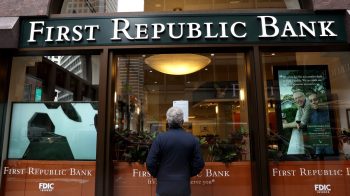
Banks are still grappling with fallout of SVB’s failure one year on
Banks are still grappling with fallout of SVB’s failure one year on

One year ago Sunday, Silicon Valley Bank failed. Two days later, Signature Bank collapsed. And later in the spring, First Republic Bank failed as well.
Government intervention played a big role in containing the fallout from the collapses. But one year on, the banking system is still feeling a lot of reverberations.
The whole banking system was caught off guard by the problems at the three midsized institutions — especially regulators, said Kathryn Judge, a law professor at Columbia University.
But now? “We have regulators who are on high alert for the possibility of problems and are actively working to try to make sure they understand where sources of fragility might exist,” she said.
For instance, the Federal Reserve said it’s been keeping a closer eye on commercial real estate loans since many have been showing signs of stress. There are also proposals to beef up the cushion banks have to carry to absorb losses.
Overall, Judge said that regulators have learned that big banks aren’t the only ones that can threaten the financial system.
“Banks the size of Signature Bank or Silicon Valley Bank have the potential to be systemically significant in a way that are going to require extraordinary action by regulators in connection with their failures,” she said.
But even though the banking system is more stable now, a lot of the problems that were revealed a year ago haven’t gone away.
A big one is the pressure banks face when interest rates rise, according to David Schiff, head of retail and consumer banking at West Monroe.
“High interest rates, particularly the longer they stay high, mean greater operating costs, mean greater uncertainty on the balance sheet, both on the deposit side and on the lending side,” Schiff said.
On the lending side, a lot of banks’ cash is tied up in loans they made back when interest rates were low. But on the deposit side, banks are paying their customers higher interest rates to keep them from running to the competition.
“Banks are really struggling, particularly with small businesses, commercial institutions and high net-worth customers that have greater degrees of deposits, to prove out that the relationship is really worth it,” he said.
And banks are trying other ways of keeping depositors happy.
Dominik Mjartan, CEO of Optus Bank in South Carolina, said that his bank’s been looking at cutting fees for services like wire transfers and fraud protection.
“We frequently have to say, ‘To win your relationship, to show you that we’re a good relationship bank, you know, we’re going to do that for very little or nothing,'” he said.
Mjartan’s bank makes a lot of loans in low- and moderate-income communities. Lately, he’s been going to big banks and saying, “Hey, you want to help those communities too. So why don’t you deposit some money with us?”
That strategy’s been working out.
“We pay them interest on it. We send them statements. The money’s insured. We agree on a term. And I’m hoping that they continue to reinvest those funds with us every time it matures,” Mjartan said.
Those deposits are allowing the bank to continue making new loans at a time when other lenders have been pulling back, he said.
There’s a lot happening in the world. Through it all, Marketplace is here for you.
You rely on Marketplace to break down the world’s events and tell you how it affects you in a fact-based, approachable way. We rely on your financial support to keep making that possible.
Your donation today powers the independent journalism that you rely on. For just $5/month, you can help sustain Marketplace so we can keep reporting on the things that matter to you.


















